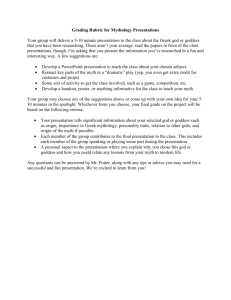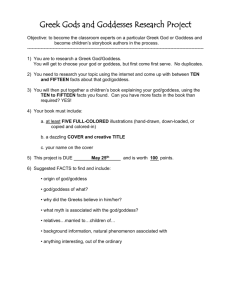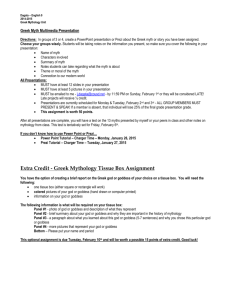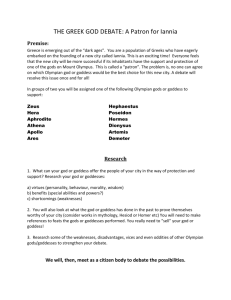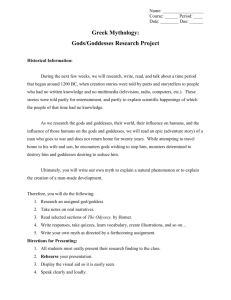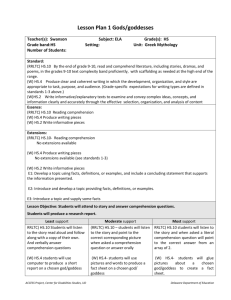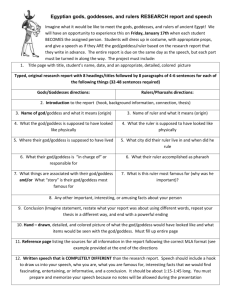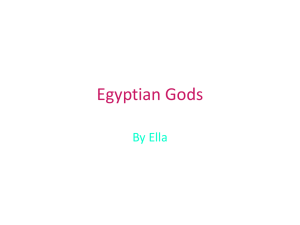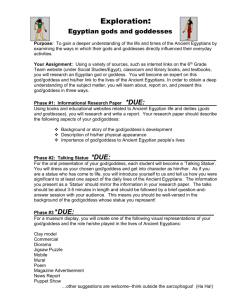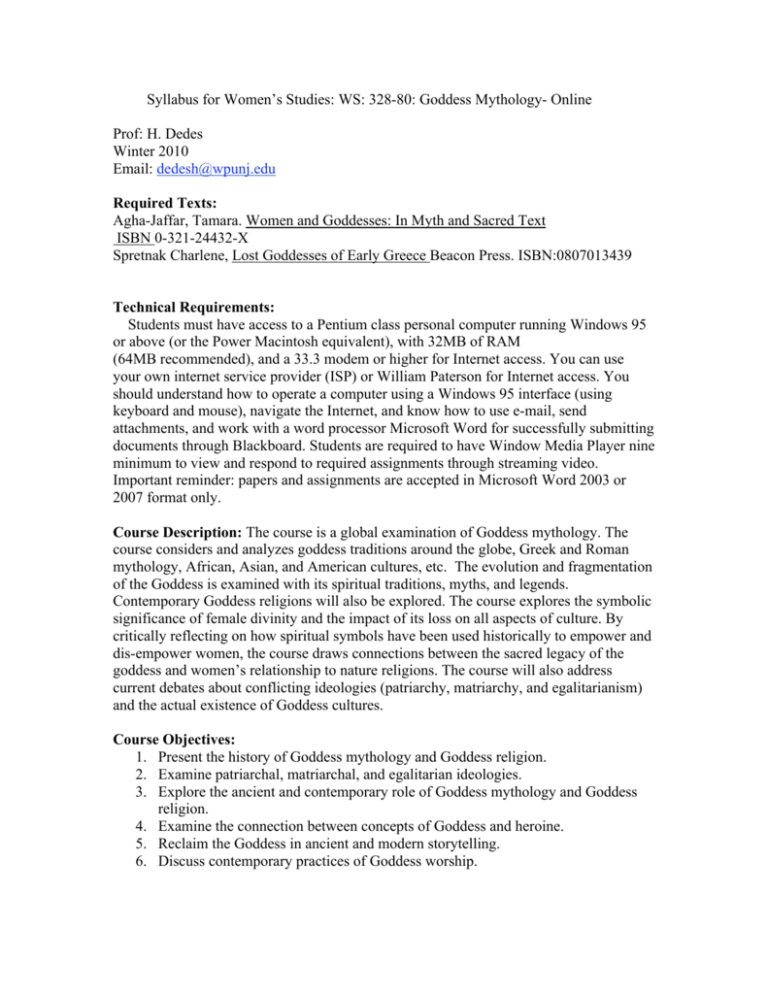
Syllabus for Women’s Studies: WS: 328-80: Goddess Mythology- Online
Prof: H. Dedes
Winter 2010
Email: dedesh@wpunj.edu
Required Texts:
Agha-Jaffar, Tamara. Women and Goddesses: In Myth and Sacred Text
ISBN 0-321-24432-X
Spretnak Charlene, Lost Goddesses of Early Greece Beacon Press. ISBN:0807013439
Technical Requirements:
Students must have access to a Pentium class personal computer running Windows 95
or above (or the Power Macintosh equivalent), with 32MB of RAM
(64MB recommended), and a 33.3 modem or higher for Internet access. You can use
your own internet service provider (ISP) or William Paterson for Internet access. You
should understand how to operate a computer using a Windows 95 interface (using
keyboard and mouse), navigate the Internet, and know how to use e-mail, send
attachments, and work with a word processor Microsoft Word for successfully submitting
documents through Blackboard. Students are required to have Window Media Player nine
minimum to view and respond to required assignments through streaming video.
Important reminder: papers and assignments are accepted in Microsoft Word 2003 or
2007 format only.
Course Description: The course is a global examination of Goddess mythology. The
course considers and analyzes goddess traditions around the globe, Greek and Roman
mythology, African, Asian, and American cultures, etc. The evolution and fragmentation
of the Goddess is examined with its spiritual traditions, myths, and legends.
Contemporary Goddess religions will also be explored. The course explores the symbolic
significance of female divinity and the impact of its loss on all aspects of culture. By
critically reflecting on how spiritual symbols have been used historically to empower and
dis-empower women, the course draws connections between the sacred legacy of the
goddess and women’s relationship to nature religions. The course will also address
current debates about conflicting ideologies (patriarchy, matriarchy, and egalitarianism)
and the actual existence of Goddess cultures.
Course Objectives:
1. Present the history of Goddess mythology and Goddess religion.
2. Examine patriarchal, matriarchal, and egalitarian ideologies.
3. Explore the ancient and contemporary role of Goddess mythology and Goddess
religion.
4. Examine the connection between concepts of Goddess and heroine.
5. Reclaim the Goddess in ancient and modern storytelling.
6. Discuss contemporary practices of Goddess worship.
(2)
Course Outcomes:
1. Identify major Goddesses in various cultures.
2. Demonstrate an understanding of conflicting ideologies including, matriarchy,
patriarchy and egalitarianism.
3. Discuss archetypes relevant to the Goddess.
4. Discuss various contemporary Goddess rituals
Course Schedule:
Day One: December 26: Discussion Board One Introduce yourself. Read
syllabus for clarification of course expectation and successful completion of the
course; then write a paragraph introduction of yourself in the first discussion
board, explaining why you enrolled in Goddess Myth, and your areas of interest
in Goddess myth.
A) Post a minimum eight sentence paragraph introduction of yourself.
B) Review syllabus and familiarize yourself with blackboard.
Posted through Blackboard Attachment in Discussion Board two of Blackboard:
Greek Gods and Goddesses Attachment
Due Monday December 28
Discussion Board Two Monday 12/28-29 due 12/30: Overview of Goddess
traditions and scholarly debate about the existence of Goddess Culture,
Egalitarianism, Matriarchy and Patriarchy.
Following assigned readings are posted in Discussion Board One
Carol P. Christ, “Why Women Need The Goddess”
Heidi Gottner-Androth, “Matriarchy” and interview with Joan Marler
Peggy Reeves Sanday, “Matriarchy as Sociocultural Form” and “Female Power”
Susan Carter- Terms
Marler, “Myth of Universal Patriarchy”
Gimbutas “Civilization of the Goddess”
(3)
Discussion Board Three: December 30th due December 31st Directly quoting from
Spretnak and the Agha-Jaffar text analyze the myths of Demeter, Persephone,
Aphrodite, Hera, and Athena for the weekly discussion board.
Classical Myth: Greek and Roman Goddesses
Chapter 4 Demeter and Persephone page 103-18 Women and Lost Goddesses
Spretnak and Spretnak’s introduction in Goddesses of Early Greece Compare and
Contrast Homeric Hymn to Demeter with pgs 66-82 Chapter 4 Agha-Jaffar with
Spretnak’s Demeter and Persephone myth
Aphrodite pages Spretnak 69-72 with Hesiod’s creation myth of Aphrodite in
Theogony
Athena Spretnak pages 97-101 with Athena and Arachne myth
Hera Spretnak pgs 85-94 with Hesiod Hera and Zeus myth.
Discussion Board Four: December 31st: Directly quoting from Aghar-Jaffar text
analyze book X of Homer’s “Odyssey” and Euripides “Medea” for the weekly
discussion board.
Greek and Roman goddesses and ancient goddesses
Circe and Medea Women and Goddesses Agha-Jaffar Chapter 5 and 6 pgs 84149
- Circe and her relevance in the “Odyssey”
Due by Monday January 4th
Discussion Board Five: Monday January 4th: Directly quoting from the text
analyzes the myths of Isis and Inanna for the weekly discussion board.
Egyptian Goddesses Isis and Sumerian Goddess Inanna pages 1-40 of Women and
Goddesses Agha-Jaffar. Due by January 5th.
Discussion Board Six: Tuesday January 5th Directly quoting from the text analyzes
the myths of Lilith, Eve, and Mary for the weekly discussion board. Lilith, Eve,
Mother Mary, and Ancient Hebrew folklore
194-226 Agha-Jaffar Answering questions at end of each chapter
Due Wednesday January 6, 2010
(4)
Discussion Board Seven: Wednesday January 6th
African, Afro-Caribbean, South American and Voodoo Goddess Myth and Religion
Agha-Jaffar Chapter 16 Oshun pages 249-56 Answering questions 1-9 at end of
the chapter.
Directly quoting from the text analyzes the myths for the weekly discussion board.
White Buffalo Woman and Corn Woman Navajo Creation Myth and Corn and
North American traditions Agha-Jaffar pgs 257-70 Answer questions at end of
each chapter.
Due Thursday January 7th
Discussion Board Eight: Thursday January 7th Directly quoting from the text
analyze the myths for the weekly discussion board.
Amaterasu, Kuan Yin, and other Asian Goddesses Agha-Jaffar 172-93
*Additional online links provided for further reading
Due Friday January 8th
Discussion Board Nine: Friday Janury 9th Directly quoting from the text analyze
the mythos of Hawwa and Maryam for the weekly discussion board.
Chapters 14 and 15 of Agha-Jaffar Hawwa and Maryam 227-48
Due Tuesday January 12
Monday January 11th Virtual Museum Assignment Due
Discussion Board Ten: Tuesday January 12th Directly quoting from the text
analyze the myths of Kali, Sita and Sarasvati.
Kali, Sita, Sarasvati and other South Asian
Goddesses Kali and Sita, Read Excepts of online version of “Ramayana”
through www.sacredtexts.com pgs 150-72 Agha-Jaffar
Due by January 13th
January 14th and 15th. Finish Goddess Paper
Goddess Research Paper due by Friday 1/15
(5)
Final Goddess research papers.
Everyone should understand the difference between scholarly article and scholarly
and the WPU online library, if not go to reference librarian or contact reference
librarian. Course documents section of blackboard will have examples of scholarly
journals. If in doubt JSTOR for Goddess scholarly journal research and if JSTOR
is unsuccessful you can send e-mail to discuss other research engines for Goddess
journals.
Breakdown of Grades:
40% Weekly Discussion Board
25% Popular Culture and Non-Popular Culture Goddess Evidence Folder
Submitted through digital drop box. Due Monday January 4th, 2010 11:59PM.
Strict deadline.
10 % Virtual Museum Assignment 2-3 pages from Judy Chicago’s Dinner Party due
date Monday January 11th, 2010
25 % Goddess Final Research Paper 7-9 pages Friday January 15, 2010th. Strict
deadline.
*Goddess Evidence Folder 25% of Final Grade due Monday January 4. Strict
deadline, Digital drop box only with working links required
20 Examples total. Write a paragraph for each example.
Select four continents to complete a global and/ or national examination of the
Goddess in popular and ancient cultures.
You can select four continents/ and or regions to examine the Goddess for your
evidence folder:
Europe
Asia
Africa
South America
North and Central America
Caribbean Islands
Three tangibles and two non-tangibles for each continent and or region selected.
The Goddess Evidence Folder must contain at least 5 examples each of 4 different
continents/and or regions of goddesses. 3 examples in each category must be tangible
(Ads, newspapers, articles, lyrics, Internet sites, etc.). Present each example with your
analysis of its meaning and significance to the goddesses.
Non-tangible examples should be drawn from your daily life and your observations of the
culture. 2 examples for each continent and/or region are required to be non-tangible.
(6)
You should be creative with your Goddess evidence folder. You could interview different
people about a particular Goddess; one option is to practice meditating to a particular
Goddess with a guided meditation and writing about that experience. If you are an artist
you could draw artwork for several Goddesses. Please be original. Total submission is 20
examples.
Non-tangible possibilities include personal observation and/or experience. These must
include relevant information (date, place, time and description of event) as well as your
analysis of the event. Another option is personal interviews. Folders will be evaluated on
the appropriateness of each example, the variety of evidence you compile, (downloading
from the same website is strongly discouraged), and the analysis you offer.
Final Goddess Research Paper 25% Final Grade: Due Friday 1/15 7-9 pages. Strict
deadline. Submitted through digital drop box.
Paper has minimum five sources. You select and with an e-mail approval from me ,
you research a topic selecting a Goddess to write a 7-9 page analytical research
paper. MLA Format, 12 Fonts, Double Spaced. It is important and necessary you
are able to retrieve enough research on your particular Goddess to write a
minimum 7 page paper.
Please do not write a paper about a male God. Writing a paper about a male God
will result in an F grade for the final paper assignment.
These papers are not to be summaries of the selected essays/journals or texts you have
selected to create your particular paper topic. A paper that is based in critical thinking
requires the following: Paper length requirement seven pages to be in contention for A or
B grade.
1. You (the student) create a valid and substantial thesis which is mentioned in the
opening paragraph. A thesis is a claim that is supported in the body of your paper.
2. You are able to prove your thesis consistently throughout the body of the paper
with supported text quotes from retrieved sources.
3. Students provide a Works Cited page.
4. Students place their last name and page number on each page of their paper.
5. Students adhere to MLA format for paper writing
6. Five sources minimum required.
(Scholarly text sources are gladly welcomed; since this is an online course it not
required that you retrieve scholarly text sources from Cheng.)
Paper should:
1. Identify the quoted sources by journal, title, name of author in the opening
paragraph.
(7)
2. Critically think and write your reaction and connection to the author’s
assignments journal/essay.
3. Critique the assigned readings in depth analyzing your selected quotations.
Students often abandon the selected quote and proceed to a new paragraph.
Recommended: purchase Joseph Gibaldi’s “Handbook for Writers of Research
Papers”.
Absences:
Our class is in asynchronous fashion. Meaning you must respond to assigned
readings by the required due date. If you post after the assigned due date and time
deadline your posting does not count. If you do not respond to three or more
discussion boards during the semester it is inevitable that you will not receive a
passing grade for the course. You have opted out of literal class time. Discussion
boards replace literal class time.
Teaching Methods and Student Learning Activities
Lectures
Discussion
Film
Guest Speaker(s)
Student Assessment
Short writing assignments
Research paper
Virtual Museum Assignment
Goddess Evidence Folder
(8)
Bibliography
Ann, Martha and Imel, Dorothy Myers. Goddesses In World Mythology. New York:
Oxford,1993.
Agha-Jaffar, Tamara. Women and Goddesses: In Myth And Sacred Text. New York:
Pearson Longman, 2005.
Alexiou, Stylianos. Minoan Civilization. Translated by Cressda Ridley. Heraclion: V.
Kouvidis – V. Manouras, Co. 2000.
Baring, Anne and Cashford, Jules. The Myth of the Goddess. New York: Penguin,1993.
Beckwith, Martha. Hawaiian Mythology. Honolulu: University of Hawaii Press, 1970.
Biaggi, Cristina. Habitation Of The Great Goddess. Manchester, Connecticut. Ideas,
Knowledge and Trends, 1994.
--. Rule of Mars. Manchester, Connecticut. Ideas, Knowledge and Trends, 2003.
Canizares, Baba Raul. Yemaya. New York: Original Publications, 2005.
Christ, Carol P. Odyssey With The Goddess. New York: Continuum, 1995.
--. She Who Changes. New York: Palgrave, 2003.
--. Woman Spirit Rising. New York: San Francisco: Harper San Francisco, 1992.
Christ, Carol P, and Plaskow, Judith, eds., Rebirth of The Goddess. New York:
Routledge, 1997.
--. Weaving The Visions. San Francisco: Harper San Francisco,1989.
Conner, Randy P. Queering Creole Spiritual Traditions: Lesbian, Gay, Bisexual and
Transgender Participation in African-Inspired Traditions in the Americas. New York:
Harrington Park Press. 2004.
Crawford, O.G.S. The Eye Goddess. Oak Park, Illoinois: Delphi Press, 1991.
Davidson, Hilda Ellis. Rules Of The Northern Goddess. New York: Routledge, 1998.
(9)
Eavsdaughter, Susan. Crete Reclaimed A feminist exploration of bronze age Crete.
England: Heart Of Albion Press, 1996.
Edwards, Carolyn McVickar. The Storyteller’s Goddess: Tales of the Goddess and Her
Wisdom from Around the World. New York: Harper Collins Publishers, 1991.
Eisler, Riane. The Chalice and the Blade. San Francisco: Harper San Francisco, 1988.
Emerson, Nathaniel B. Pele and Hiaka A Myth from Hawaii. Honolulu, Hawaii: ‘Ai
Pohaku Press, 1915.
--. Unwritten Literature of Hawaii. Honolulu, Hawaii: Mutual Publishing, 1998.
Fang Yu, Chun. Kuan-Yin. New York: Columbia University Press, 2001.
Farrar, Janet and Stewart. The Witches’ Goddess. Blaine, Washington Phoenix
Publishing, 1987.
Frymer-Kensky, Tikva. In the Wake of the Goddesses. New York: Fawcett Columbine,
1992.
Gadon, Elinor W. The Once and Future Goddess. San Francisco: Harper San
Francisco,1989.
Gimbutas, Marija. Civilization Of The Goddess. San Francisco: Harper San
Francisco,1991.
--. Goddesses and Gods Of Old Europe. Berkeley: University of California Press, 1982.
--. Living Goddesses. Berkeley: University of California Press, 2001.
--. Language Of The Goddess. New York: Thames and Hudson, 1989.
Gleason, Judith. Oya In Praise of an African Goddess. San Francisco: Harper San
Francisco, 1992.
Goodison, Lucy, Moving Heaven and Earth. London: Women’s Press, LTD.,1990.
Hagstoz, Hera. The Spanish Goddess. New York: I Universe, Inc., 2005
Hawkes, Jacquetta Dawn of the Gods. New York: Random House, 1968.
Heath, Jennifer. On The Edge Of Dream. New York: Plume Book, 1998.
Jung, Carl Gustav. Jung on Alchemy. Princeton: Princeton University Press. 1995.
--. Mysterium Coniunctionus. Princeton: Princeton University Press. 1970.
--. Portable Jung. New York: Penguin Books. 1971.
(10)
Kane, Herb Kawainui. Pele. Captain Cook, Hawaii: Kawainui Press, 1987.
Leeming David and Jake Page. Goddess: Myths of the Female Divine. New York:
Oxford, 1994.
Markale, Jean. The Great Goddess. Rochester, VT: Inner Traditions, 1997.
Marinatos, Nanno. Minoan Religion. Columbia, South Carolina: University of South
Carolina Press, 1993.
Mookerjee, Ajit. Kali The Feminine Force. Rochester, VT: Destiny Books, 1988.
Murphy, Joseph M. and Sanford, Mei-Mei. Osun across the Waters. Bloomington:
Indiana University Press, 2001.
Spretnak Charlene. Lost Goddesses. Boston: Beacon Press, 1978.
Starbird, Margaret. The Goddess in the Gospels. Rochester, VT: Bear and Company,
1998.
Starhawk, Dreaming the Dark: Magic, Sex & Poltics. Boston: Beacon Press, 1982.
--. Earth Path. New York: Harper San Francisco, 2005.
--. The Spiral Dance. New York: Harper San Francisco, 1979.
Stone, Merlin. When God Was A Woman. New York: Barnes and Noble, 1993.
--. Ancient Mirrors of Womanhood. Boston: Beacon Press, 1979.
Walker, Barbara G. The I Ching of the Goddess. New York: HarperCollins
Publishers,1991.
Weaver, Lloyd and Egbelade, Olurunmi. Yemonja. New York: Altheia Henrietta Press,
1998.
Wilshire, Donna. Virgin Mother, Crone: Myths & Mysteries of the Triple Goddess.
Rochester, VT: Inner Traditions,1994.

